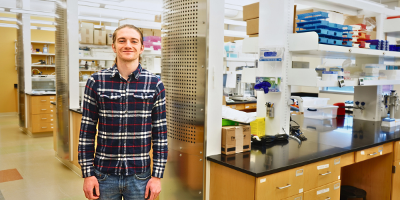George Santarpia, senior biochemistry major at the University of Nebraska–Lincoln (UNL), has contributed to multiple chemical and biological defense projects with the National Strategic Research Institute (NSRI) at the University of Nebraska.

In addition to his academic efforts and NSRI contributions, George serves as the president of the UNL microbiology club, organizing events, coordinating with other officers, recruiting members and inviting speakers to campus. He served as a teaching assistant in a lab focused on antibiotic resistance research as part of an honors course at UNL, taught by Dr. Karin van Dijk. George currently serves as the student representative on the advisory board for the UNL microbiology program. As the student representative, he attends meetings, coordinates between the club and the program and assists with program events and curriculum revisions, among other duties including but not limited to mentoring and leading hands-on training for new lab members.
Briefly describe how you have contributed to NSRI projects so far.
One of my main projects has involved finding and characterizing bacteriophages, viruses that infect bacteria, for use as alternatives to antibiotics in disease treatment and environmental applications. The bacterial targets have included human pathogens with high antibiotic resistance, such as salmonella and staph, as well as environmental bacteria, such as cyanobacteria that cause harmful algae blooms and produce toxins.
Another project has involved testing antibody-based treatments and prophylactics against neurotoxins like tetrodotoxin, commonly known as pufferfish toxin, and saxitoxin, a paralytic shellfish toxin. Finally, I am developing a cell line that fluoresces when infected with a broad range of viruses, to help detect and quantify viruses in samples.
What have you found most interesting about the work you’ve done with NSRI?
I have done most of my work at the NSRI Collaborative Biosecurity Laboratory on the University of Nebraska–Lincoln East Campus. One of the main advantages of this location is that virologists in many different specialties are all nearby in the building. This allows us to share reagents and equipment easily and opens opportunities for collaboration. The laboratory is also quite spacious and there are shared equipment rooms and facilities, which allows us to set up various instruments in the laboratory itself and access other pieces of equipment that we would be unable to use otherwise.

What would your peers find most fascinating about the work?
I think my peers would find the scope and potential of bacteriophage the most fascinating. There are an estimated 10^31 phage on the planet (or ten quadrillion quadrillion), which is likely more than the number of stars in the entire universe. Unlike cells, which only have double-stranded DNA genomes, they can have genomes composed of single or double-stranded RNA or DNA. The genome is carried inside a shell known as a capsid, which can have a wide array of shapes, including filamentous—noodle-shaped—and tailed with a head shaped like a die and long fibers at the opposite end, which are the most common. These phage also have enormous potential as antibacterial agents, since their range and ability to evolve can help avoid resistance, which is especially important as the problem of antibiotic resistance continues to grow.
What is it like to tell your friends, family, and peers that you’re working on a project for the DOD?
It is very rewarding to be able to tell my family and friends that I am working on a project for the Department of Defense. It is often difficult to communicate the importance of scientific research, but having projects with the DOD makes it clear that I am doing research to help people and protect them from disease and potential biosafety threats.
Do you feel a sense of patriotism in doing this work?
I do feel a sense of patriotism from this work because it is meant to help protect U.S. citizens from potential bioterror attacks and help our troops combat disease on the frontlines. I do also hope that the progress made in the lab can also help people in other countries who may be suffering from similar diseases.
###
About the National Strategic Research Institute
Through the National Strategic Research Institute at the University of Nebraska leading scientists deliver innovative national security research, technology, product and strategy development, training and exercises, and subject matter expertise to the Department of Defense and other federal agencies. One of only 15 DOD-designated University Affiliated Research Centers in the country, NSRI is sponsored by U.S. Strategic Command and works to ensure the United States’ safety and preparedness against increasingly sophisticated threats. Read about our mission.

